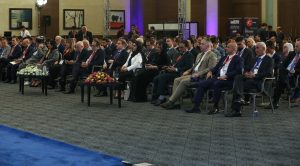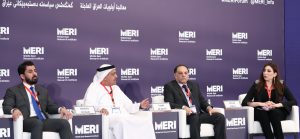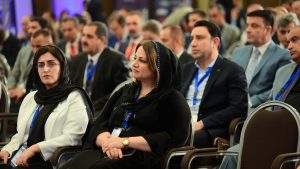Iraq’s Energy Priorities: Oil, Gas and Renewables
In this panel discussion, Policy makers and leaders in the industry focused on the challenges and opportunities facing Iraq in the energy sector. They analysed the barriers for increasing oil and gas production and achieving energy independence in the country, and the significance of balancing production levels with price stability.
- Ahmed Mufti, Deputy Minister of Natural Resources, KRG
- Abdulla Al-Qadi, Executive Director, Crescent Petroleum, Iraq
- Falah Al-Amiri, Advisor to the Prime Minister of Iraq & Former SOMO Chief
- Zainab Rabee, Journalist, Al-Sharqiya (Moderator)
Falah Al-Amiri highlighted the contradiction between the Ministry of Oil’s goal to increase production by 2 million barrels per annum, and concerns about a potential independence from oil by 2030. He drew attention to the impact of Iraq’s recent history, including financial and political upheavals, on the country’s ability to meet production targets. Al-Amiri stressed the need for strategic reserve productions to address market uncertainties, citing examples from other oil-producing nations like Saudi Arabia.
Abdulla Al-Qadi echoed the importance of increasing oil production to stabilize the global economy. He pointed out that many oil fields worldwide had reached a level of maturity, necessitating new investments to sustain supply and demand. Al-Qadi commended Iraq as a promising opportunity due to its untapped reserves, emphasizing the need for substantial investments, estimated to be at least $100 billion, to develop the country’s oil industry. He cautioned against potential price hikes, advocating for a balanced price range, “between $75 to $95 to ensure both consumer affordability and continued industry development”.

In response to Al-Qadi’s insights, Zainab Rabee raised concerns about the potential contradiction between the call for increased production and the desired price stability. Al-Qadi clarified that the fluctuation in prices is influenced by factors such as supply and demand, political considerations, and environmental factors. He emphasized the delicate balance required to maintain prices between $75 to $95 to ensure consumer affordability and industry sustainability.
On the fate of Kurdistan Region’s oil amid talks about resuming Kirkuk oil exports to Turkey, Deputy Minister Ahmed Mufti gracefully deflected the specific question about oil resumption negotiations, emphasizing the broader perspective and significance of addressing broader energy concerns beyond oil, particularly focusing on gas and electricity. He corrected the misconception about the predominant role of water in providing electricity, stating that 90% of Kurdistan Region’s electricity comes from gas. The region has excelled in utilizing natural gas for electricity production, with a notable potential to increase gas production.
Mufti provided valuable statistics, highlighting the region’s capacity to contribute significantly to Iraq’s overall gas supply. “Kurdistan produces nearly 50% of Iraq’s total gas production.” He said. He also expressed optimism, expecting the region to reach a point where it produces 60% of Iraq’s gas within the next six months to a year. He then praised the Kurdistan Region’s conducive investment atmosphere, exemplifying Crescent Petroleum’s successful extraction of 500 million cubic feet of gas daily. “The challenges with gas lie in logistics,” requiring infrastructure like pipelines for efficient transportation.
Mufti brought attention to the overlooked aspect of renewables and the absence of Iraq from the global carbon credit scenario. He stressed the importance of tackling the issue of flare gas burning, a major contributor to Iraq’s environmental challenges. The focus on renewables, coupled with initiatives like planting trees, can significantly impact the environment.

The Deputy Minister introduced the concept of carbon credit as a crucial factor in the investment environment, highlighting a project in Garmiyan where flare gas is converted to electricity with the aim of acquiring carbon credits. He emphasized the moral and financial significance of carbon credit, urging Iraq to join the global effort in environmental preservation.
Zainab Rabee redirected the conversation to Al-Amiri, addressing the critical issue of waste due to the burning of flare gas in Iraq, estimating a daily loss of up to $5 million. Al-Amiri described Iraq’s evolving strategy to address this challenge, and referred to the government’s directive to focus on carbon credit, emphasizing the need to convert burned gas into production lines, by collecting and trading it internationally. This concerted effort aims to reduce the percentage of burned gas, and “significant progress has already been made in lowering it to around 35%.” He said.
Al-Amiri delved into the global transition from fossil fuels to renewable energy, categorizing countries based on their progress. Iraq, being a major producer of fossil fuels, is navigating this shift more slowly than some advanced economies. He emphasized the importance of addressing burned gas, its environmental impact, and the need to adopt renewable energy sources. Despite having 8,000 to 10,000 megawatts of solar energy potential, Iraq’s actual utilization has been limited. He stressed the need for a ten-year transition period to significantly reduce reliance on fossil fuels for electricity generation.
Abdulla Al-Qadi cited the UAE’s success in implementing a successful renewable energy strategy, and the country’s commitment to reducing reliance on fossil fuels. He credited the UAE’s achievements to meticulous planning, beginning in 2014, with a focus on diversifying energy sources. The region’s largest solar power plants are now in Abu Dhabi and Dubai.
Abdulla Al-Qadi acknowledged the environmental impact of oil extraction, particularly the emission of greenhouse gases contributing to diseases and cancer in oil-producing provinces. He discussed the UAE’s plan for environmental protection and referred to similar initiatives in neighboring countries like Saudi Arabia, Morocco, Egypt, and Jordan.

On Kurdistan Region’s potential for renewable energy projects, Ahmed Mufti highlighted the unique position of Kurdistan, with cleaner natural resources like gas and a geographical advantage for hydropower. He stressed the importance of strategic planning, noting that each country or region’s model for transitioning to renewables must be tailored to its specific needs.
Zainab Rabee took comments and questions from the audience. Among these were expressions of concerns about gas investments that are currently not benefiting the residents of the Kurdistan Region of Iraq (KRI) in the first place, emphasizing the importance of job creation for the youth. Other concerns related to the investors commitment to monitoring the negative health effects on people living around gas investments. Al-Qadi emphasized the commitment of gas-producing companies to treat gases and reduce their negative environmental impact. He mentioned his company’s achievement of reaching the net zero stage and using solar energy to generate power.
A question was posed about the implementation of wind power in the KRI, citing the region’s mountainous areas as suitable for wind power. Ahmed Mufti highlighted the need for a hierarchical approach to energy sources, focusing first on gas, then solar, and finally wind. He stressed the importance of considering the KRI’s capability to produce energy and making advancements with the available gas.
MERI Forum 2023
Addressing Iraq’s Immediate Priorities
10 & 11 October, 2023
Session 2: Iraq’s Energy Priorities: Oil, Gas and Renewables
Session Video

